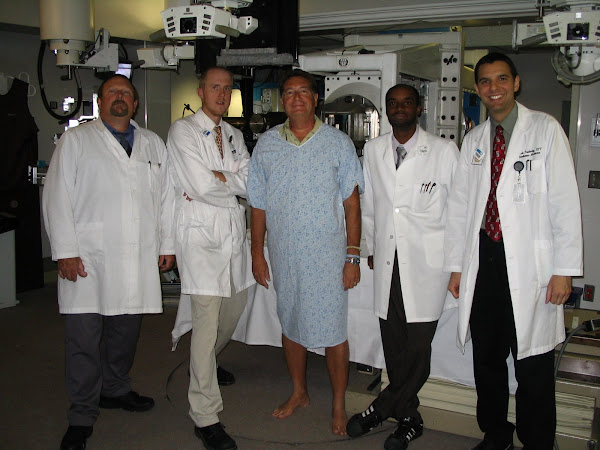If you are considering prostate cancer surgery please review studies as this and explore my protstate cancer blog before making a decision. This study came across from Rueters...Read on:
Sex problems vex men long after prostate surgerySexual problems appear to be more distressful to men after prostate-removal surgery than urinary problems do, a new long-term follow-up study shows.
The findings suggest that while men may get used to incontinence and other urinary problems after surgery, sexual function is so important to them that adapting to a lower level of functioning is more difficult, Dr. Walter R. Parker and colleagues from the University of Michigan Health System in Ann Arbor report.
All of the 434 men in the study had localized prostate cancer, meaning the disease had not spread beyond the prostate gland, and each underwent radical prostatectomy - complete removal of the gland. The approach is controversial when used to treat early-stage disease because of the impact the surgery can have on men's quality of life and the low risk that the disease will be fatal.
Because the men have such a high likelihood of survival, long-term quality of life becomes an important consideration. Parker and his team used a survey called the Expanded Prostate cancer Index Composite (EPIC) designed to assess various aspects of quality of life after prostate cancer treatment and theirs is the first study to compare men's scores before the surgery and a full five years afterwards.
The results showed that urinary function and incontinence worsened soon after the surgery, but had improved by 12 months after the surgery, at which point 38 percent of the men had reached baseline levels of urinary function. This improvement remained stable up until four years after the surgery, and then declined.
In terms of "urinary bother"-meaning how bothersome men found their urinary symptoms-three-quarters of patients had returned to their baseline levels within a year of the surgery, while 21 percent actually showed a significant improvement in urinary bother four years after surgery.
Although men's sexual function continued improving for up to two years after the surgery, just 28 percent had returned to the level of sexual function they reported before the surgery at this point. And the level of sexual bother they reported didn't improve until 12 months after the surgery; at three years after the surgery, about 37 percent of men reported the same level of sexual trouble that they had before undergoing the surgery.
Among men who reported high levels of sexual function before the surgery, just 11 percent had returned to their pre-surgery sexual function two years after prostatectomy, compared to about 63 percent of the men with low sexual function.
The authors write that they were surprised by the mismatch between "bother" levels and recovery of function. Despite fewer than half of the men (38 percent) returning to preoperative urinary function levels at 12 months, for example, three quarters of them (74 percent) reported being back at their baseline distress levels over it -- suggesting they had become used to their new level of function.
With sexual function, the pattern was opposite. "Interestingly," they write, "the expected improvement in sexual bother scores over time as patients habituated to their decreased...function was not found."
While men in the study did not undergo a "structured and recorded recovery program" to restore sexual function after the surgery, Parker and his colleagues note, they were instructed to do Kegel exercises and offered prescriptions for drugs to restore erectile function.
But given the weak, slow improvement seen in men's sexual function in the current study, the researchers add, they have initiated a "structured early and long-term erectile rehabilitation program to augment sexual recovery as early as possible, yet also convince patients to maintain their erectile rehabilitation efforts long-term."
SOURCE:
link.reuters.com/suq24p BJU International, online August 26, 2010.
















